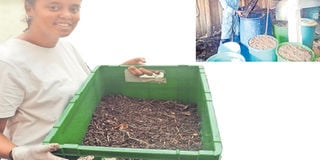Gleaning clean money from dirty compost insects

Talash Huijbers at the Terrasol Farm in Red Hill, Kiambu County. From her insect-keeping agribusiness, she produces an average of six tonnes of crushed black soldier flies that she sells from Sh90 to Sh100 per kilo to poultry and cattle keepers who make their own feeds. PHOTOS | WINNIE LELEI | NMG
What you need to know:
- It all started over six months ago when Huijbers, who holds a bachelor’s degree in International Food and Agribusiness from HAS University of Applied Sciences in the Netherlands, saw a gap in the market in naturally produced but affordable proteins for livestock.
- Huijbers notes that growing the larvae does not need special breeding structures as she uses plastic trays, which retain warmth.
- Grinding, according to her, is not entirely necessary, but it eases the feeding process, giving the larvae time to process and concentrate the proteins.
- She produces an average of six tonnes of crushed black soldier flies that she sells from Sh90 to Sh100 per kilo to poultry and cattle keepers who make their own feeds.
At Terrasol Farm in Red Hill, Kiambu County, we meet Talash Huijbers, 23, a Kenyan of Dutch descent.
Her passion for agriculture has made her venture into the little-practised black soldier fly (Hermetia illucen) farming.
A Seeds of Gold team finds her in one of the chambers where she keeps the flies.
Before entering the chamber, we disinfect our feet on a spongy mat, a move that is aimed at protecting the black soldier fly larvae. She keeps thousands of the flies.
It all started over six months ago when Huijbers, who holds a bachelor’s degree in International Food and Agribusiness from HAS University of Applied Sciences in the Netherlands, saw a gap in the market in naturally produced but affordable proteins for livestock.
“I researched and found out that the common source of protein in animal feeds is fish, but this is dwindling due to overfishing and pollution. We realised that we could provide livestock farmers with an alternative to fish and synthetic proteins which are extremely expensive by growing black soldier flies, which have high levels of protein,” she says.
According to the International Centre of Insect Physiology and Ecology (Icipe), the fly’s larvae contain high protein and fat levels, 42 per cent and 29 per cent respectively and with the ease of growing and harvesting them, the fly is one of the world’s most recommended sources of protein for animal feeds.
Huijbers notes that growing the larvae does not need special breeding structures as she uses plastic trays, which retain warmth. The worms feed on organic waste material such as potato, oranges and mango peels as well as tomatoes, eliminating the cost of buying food.
“I collect organic trash from hotels and juice producers with whom I have an arrangement where I provide them bins for separating the organic from non-organic matter,” says Huijbers, who started the venture with Sh80,000 on a quarter-acre after buying the flies from Icipe.
One of her key investments was a jua kali-made crushing machine for grinding the organic waste.
HATCHING IS VERY DELICATE
Grinding, according to her, is not entirely necessary, but it eases the feeding process, giving the larvae time to process and concentrate the proteins.
“It takes 14 days from the time they are hatched for the larvae to be market-ready.”
She knows the larvae are mature when they begin to turn dark. The head turns upward and it becomes dormant, not eating anymore.
“At this point, the larvae are about to become flies and their protein concentration is at its peak. We retain at least 10 per cent of all the flies which then lay the eggs needed to ensure more production. The rest is crushed using a grinder and packed for sale.”
She produces an average of six tonnes of crushed black soldier flies that she sells from Sh90 to Sh100 per kilo to poultry and cattle keepers who make their own feeds.
“The larvae are normally mixed with other feeds for livestock such as pigs and chickens,” says Huijbers, whose father is a Dutch and mother, a Maasai.
Her typical day begins at 6am, where she ensures that there is enough feed for the larvae, checks the temperature in the hatching room and has to make calls to hotels from where she collects waste to confirm availability.
The young farmer says that the greatest challenge in growing the insects lies at the hatching stage.
“Hatching is very delicate and the success rate is very low depending on factors such temperature and humidity,” says the farmer who has nine workers, five who are technicians.
She says the hatching rate has increased significantly over time due to research and experience gained.
“If anyone wants to grow the flies, it is recommended they buy already hatched larvae, which have more chances of survival. The thing is start small and be open-minded,” she advises.
Dr Chrysantus Mbi Tanga, a leading research scientist at Icipe, notes that each fly lays between 500 to 900 eggs at a go.
Cow dung, human waste, rabbit, goat and chicken manure can be used in the place of kitchen waste to feed the flies, but hygiene must be high to avoid contamination.




